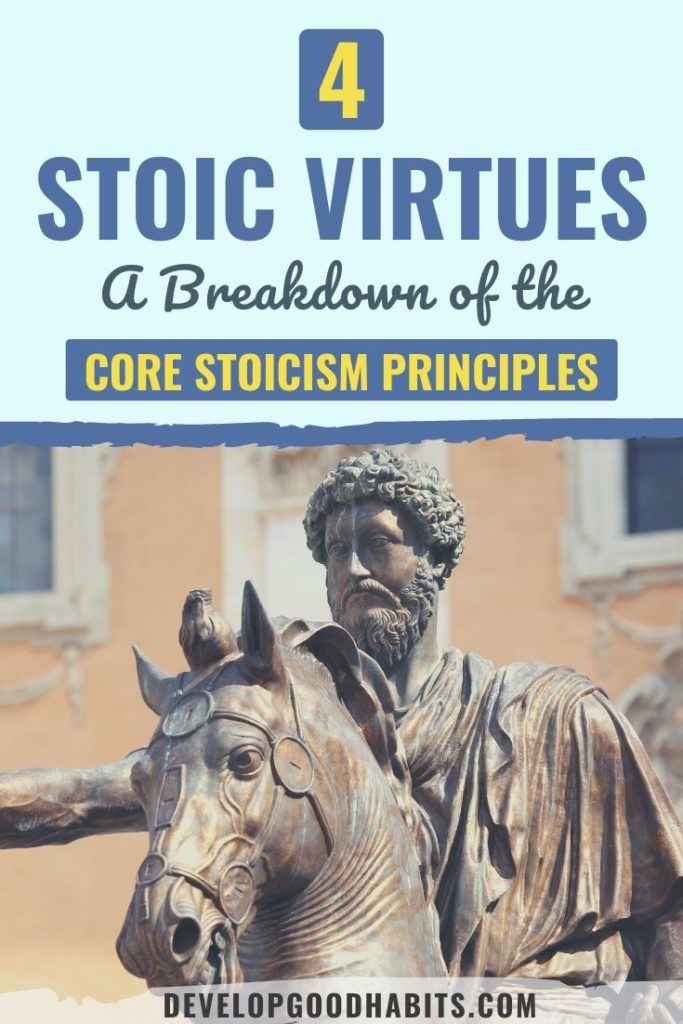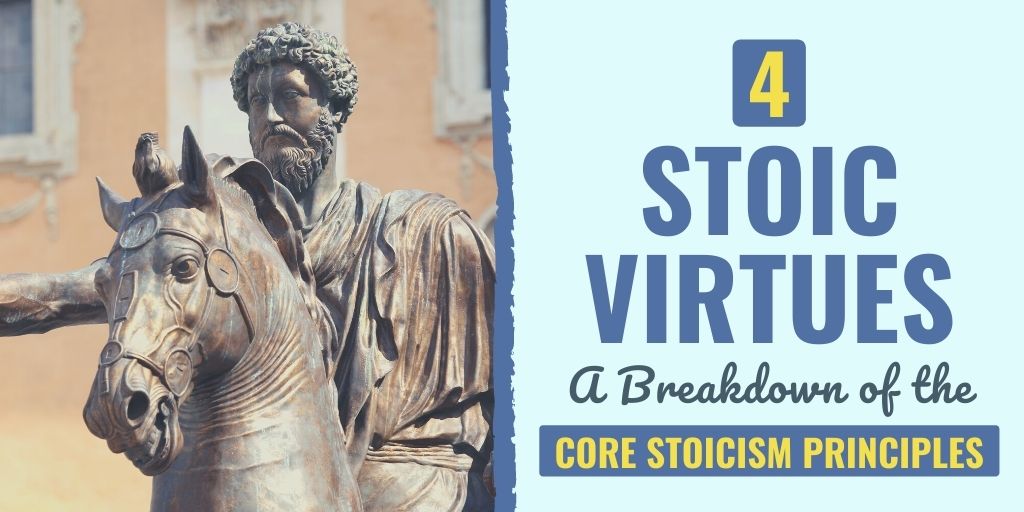“Est quodcumque est”. I can picture Zeno, the founder of Stoicism, standing on the steps of Stoa Poikile as his followers gathered to hear him talk about stoic virtues… “It is what it is.”
If you had to break down what Stoic thought entails, this would be the perfect statement. Of course, the philosophy is a bit more involved than this simple phrase would have you believe. The prevalence of this phrase today; however, shows how this philosophical outlook is making a comeback.
When you have the chance, you may want to read our quick overview of this philosophy, How to Be Stoic. In the meantime, read on to find out where this philosophical school began and what the four stoic virtues are all about.
What Is Stoicism?
The first definition of a stoic person was cited in 1579. It stated that a stoic was someone who represses feelings or endures patiently. Over time, people also came to see this as referring to someone who is indifferent to all emotions… including pleasure, pain, grief, anger, or joy. The stoic person does not ignore these feelings – they simply don't allow emotions to control them.
Stoicism is about accepting the fact that the world is unpredictable. Both good and bad things are going to happen, as are things that are neither good nor bad. The latter things simply are and it is an emotion that makes us believe they are good or bad. We don't have control of much of what takes place in the universe. We do, however, have control over how we respond.
Regardless of what happens, we have the capacity to use reason to make choices on how we will react. There is a small window between feeling an emotion and reacting. Stoics believe that we should use that window to determine whether or not the emotion will make the situation better. If not, it is best to let it go.
Stoicism also teaches that we should always strive to do the right thing. It is all that we actually have control over. Virtue is the best judge of any action, and therefore, any man. Control what you can, mainly your reaction, and let the rest take care of itself because it is going to happen with or without your consent.
The History of Stoicism
Between 323 BC and 31 BC, the Mediterranean was going through what is called the Hellenistic period. During this time, people were starting to get interested in some of the more genteel activities instead of war. Artists, musicians, and others found their voices during this time.
At the same time, many philosophers emerged, searching for the meaning of life and things related to living a successful life. The center of much of this activity was Athens. This is the environment Zeno of Citium crashed into.
Zeno was a sea captain who was traveling with a shipload of purple dye. This dye, harvested from sea snails, was considered rare and what was contained on the ship would have brought Zeno a fortune. As fate would have it, the ship crashed and Zeno lost the entirety of his cargo. He was stranded, penniless, in Athens. Instead of worrying about his misfortune, Zeno took advantage of the times and started to study many of the greatest minds of the time, especially Socrates.
It is Socrates' teaching that is believed to be the basis of Stoicism. Zeno also studied with Crates of Thebes, who was a Cynic philosopher. Eventually, he started teaching himself, combining the knowledge he had accumulated into his own school of thought.
Zeno founded Stoicism around 300 BC. It was based on the principle that a good life is one that is based above all else on virtue and is lived in alignment with nature. By 155 BC, the philosophy had reached Rome.
At that time, the four main teachers were Seneca the Younger, Musonius Rufus, Epictetus, and Marcus Aurelius. In more modern times, Stoicism has influenced people like Thomas Jefferson, Theodore Roosevelt, John Steinbeck, and Nelson Mandela.
The Four Stoic Virtues
You may find accounts of Stoicism having ten or more principles, and these are not inaccurate. However, all of them are part of four basic Stoic virtues that we are about to explore. These four virtues are wisdom, courage, justice, and temperance.
Wisdom
The first virtue is understanding what is good, what is evil, and which is neither. Good things are happiness, tolerance, and compassion. Evil can be anger, hatred, or jealousy. In most cases, things fall into the neutral category. Once you have obtained this knowledge of the difference, it is necessary to use that knowledge to make a logical decision on a course of action.

Next, you need to recognize that there is a space between feeling an emotion and acting on it. It is necessary to recognize that space and ask yourself if the emotion you are experiencing does anything to make the situation better. If the answer is negative, it is then thought you need to let the emotion go and not act on it. This is meant to prevent making decisions based on impulsive and irrational thinking.
Courage
When asked what words would help a person thrive, Epictetus replied, “Two words should be committed to memory and obeyed, persist and resist.” He was talking about the virtue of courage. This courage is the strongest kind and is often difficult to follow. It is the courage that allows one to stand alone, face persecution, and still stay strong even if it means certain death.
It is being unwavering in standing up for what you believe is good. It is being willing to risk yourself for your fellow man. You must have the courage to hold onto your principles, speak your mind, and insist on the truth, no matter the personal cost.
Justice
In the Stoic mind, justice doesn't relate to legal matters. It is refraining from acting in any manner that causes pain or injury to another being. We have a duty to our fellow man to help when possible. Justice, in this sense, can be broken down into five ideas:
The idea of justice is based on what is called sympathera. This is the belief in the inter-dependence of all things in the Universe. We are all one. As Marcus Aurelius stated: What harms the hive harms the bee.
Temperance
Aristotle calls temperance “the Golden Mean” and says it is found exactly in the middle between excess and deficiency. The Stoic believes that nothing should be done in excess. This includes both the good and the bad. Instead of endlessly seeking more, we should be happy with having what is essential, then what is enough. It is believed that the search for more in excess of this, and even having more, leads to unhappiness and discontent.
Temperance also teaches that you can't rely on the fleetingness of happiness. This also applies to the fleetingness of pain. All things have their limit. Only by being satisfied by having what is essential, and settling for enough, can true contentment be achieved.
Tips on Becoming Stoic
Practice Mindfulness
There are two practices we can all do to help us achieve the Stoic standard. The first is mindfulness. It is necessary to be mindful in order to recognize that moment between feeling an emotion and acting upon it. By practicing mindfulness on a regular basis, this knowing becomes almost automatic. Things like meditation can help in this regard.
Practice Daily Reflection
Daily reflection, such as keeping a journal, is the second thing that can help you along the way. Each night, take a few minutes to look within yourself. Ask yourself what good you did during the day. Then ask yourself what you could have done better. Finally, ask what you consider to be the best version of yourself.
Final Words on the Four Stoic Virtues
The idea of a Stoic being unemotional is completely over-exaggerated. As you can see by the four stoic virtues, the task is not to avoid feeling… but to simply not become a slave to it. If it doesn't serve the purpose of making things better, let the emotion go.
The same goes for people in your life. Wish even your enemies the best and meet them with pity rather than blame. Love, but do not allow your happiness to be bound to the return of that love.
Finally, remember that a person's true beauty lies in their core character and personality. Everything else can be taken from you in life, but your core character will remain yours forever. Care for it as the precious possession it is.


